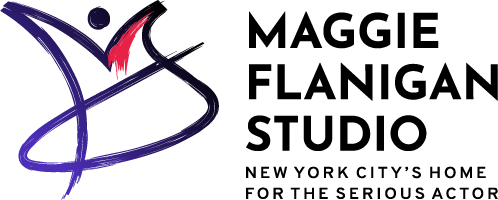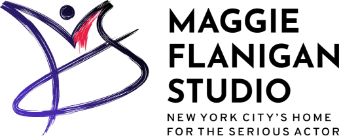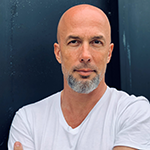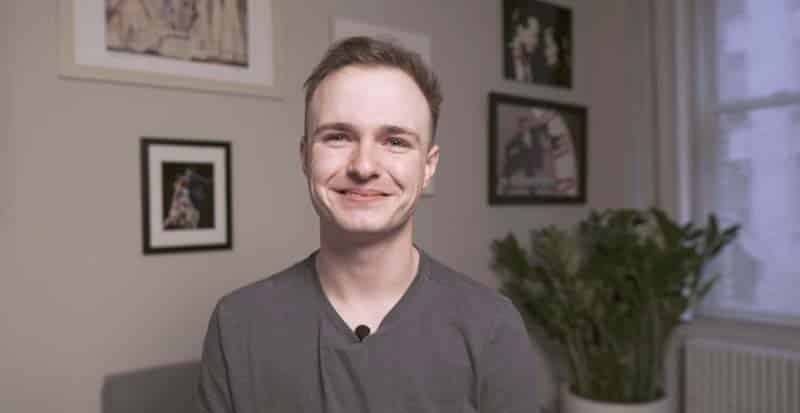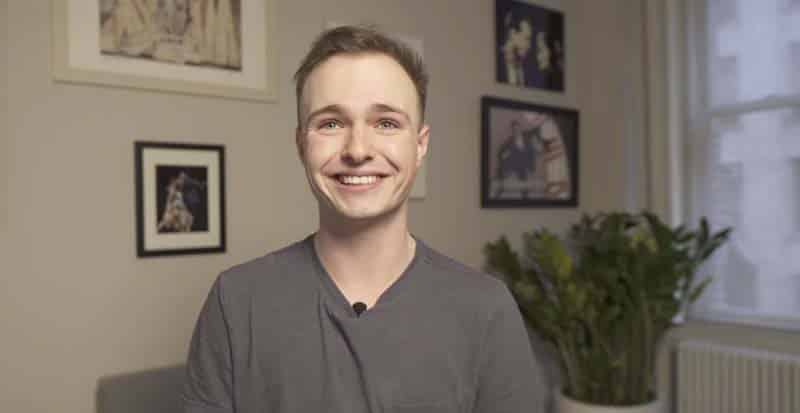APPLY FOR ADMISSION
FIRST YEAR MEISNER ACTING PROGRAM

BEGINS
SEPTEMBER 10TH

Call To Schedule an Interview
(917) 794-3878
Emotional Preparation Has Opened My Mind
The two year acting program in New York with Maggie Flanigan Studio, trains progressional actors to have long careers on stage and in film. Jayden Key, an actor studying at the studio, talks about how the training has helped him with intense mental blocks.
Two Year Acting Program Interview: Jayden Key
Logan: What did you think it meant to train as an actor before you started at the studio?
A: I don’t even know. It’s hard even to say because you can read theory books, but it’s been unexplainable, is what I’ve ever experienced in the training. Before I decided, it was you learn different techniques. That was it.
Q: Is this your first time doing any Meisner work?
A: Yes.
Q: How does the Meisner technique connect with you as an actor?
A: The imagination, I guess. One of the most significant things that happened in my life was the death of my brother. Before, when I acted and needed to be sad, I would think about him. If I were in these high-intensity scenes, if I couldn’t feel something, I would think about being at his funeral, experiencing his death, and trying to let that trigger an emotion in me. A lot of times, it wouldn’t work. Sometimes, it would work. Then half the time, I’m the most inconsistent actor, and you’re doing a stage show, working with equity actors, and you realize, “Oh, f—, oh.”
You realize, “I’m not up to par.” Sometimes, I’m doing well, but sometimes, I’m not. I just felt like when we’re so early on. Still, especially during emotional preparation, it’s opened my mind up to how to experience without forcing, without pushing out emotion, and without messing myself up mentally.
Q: Yes, of course. What have you been learning about yourself this year through the work that’s been a surprise or changed you?
A: Just what emotions I block. The training so far pins you up against yourself. There are these times when I don’t know what to do. I’ll find myself knowing that this intense rage may be behind something, and I’ll feel myself just throwing it away, knocking it down, and getting as far away from it as possible. I think that’s been the most significant thing I realize, like once I’m scared to feel this way or I’ve decided to have the courage to love somebody.
Having these intense mental blocks that Midori talks about like, “Oh, you were trained to guard yourself against all this trauma.” It’s not bad. It’s just the way we are. The training so far has just been allowing me to expose myself.
Q: You mentioned using what actors would call memory recall, to recall something that happened in your life. How do you feel like the work you’re doing now with the Meisner Technique counteracts that idea?
A: Well, it’s funny. I’ve been able to experience a lot more negative and intensely rageful emotions by using my imagination than by actual circumstances. So that’s been huge for me, to sit and think about something that isn’t based on maybe people I know, but just based on an entirely imaginary idea of something and letting that somehow make me feel something. So I’ve just been surprised by that specifically.
In acting class, they’d asked us to choose a dream show, a director, and the cast. She’d walked us through these steps. You get a call from your agent; you have this audition, yadda, yadda, it keeps going on, keeps going on. Finally, the show opens, and it’s like I’m entirely in tears by the end of the show opening. I don’t understand how I can be so emotionally ramped up about it. It’s just crazy.
I’ve just experienced before when I would deal with traumatic acting situations that would induce these terrible internal feelings. That hasn’t been the case so far.
Q: Do you find once the activity or the scene is so much easier to let go of it once it’s over?
A: At first, no. It took some time to say, “Oh,” because it’s so different. The acting is reality. It’s like, “What does that even mean? Acting is acting.” Like before, you’re trying to feel these intense things and scrape through how to do that. This, it just feels safer, I guess. Afterward, like last class, I cried three times for entirely different reasons about the same circumstance. It was deeply– It felt so viscerally real. Later, it was like relieving. I remember when Charlie had said, “Okay, let’s do it again.” I wasn’t dreading doing it again.
I was like, “Okay, let’s do it again. That sounds fine.” The second time, “Let’s do it again. Okay, we can do it again. That’s fine.” I’m probably going to get emotional talking about this, but it’s relieving knowing I can do that. It’s just something since I graduated from high school and I’d worked for years; there are just some things I wasn’t getting answers for. I wasn’t finding any solutions from anybody. I would see some people doing these things I didn’t understand. So it’s exciting to know that I do have the potential to be that.
Q: It’s probably a relief that you don’t have to put so much traumatic emotional pressure on yourself.
A: It’s all like just if I work hard, if I keep my head low, that’s something I’m proud of myself, and it’s like just really dedicating myself to something that somehow, all these emotions spawn out of all that. It’s been shocking, for sure.
Q: You mentioned working with Midori and Sarah Fay. How has the work that you’re doing in those classes affected the work that you’re doing in acting?
A: Well, I was talking about earlier the physical. Before, if I needed to get angry I would try to feel what it would feel like to be angry. My body would want to do something to somebody, and I was doing all these arbitrary, not right ideas to invoke some emotion in me. Voice and movement are hard. They’re just as hard as the acting class. Voice helps you literally with your voice. It makes you realize, “Oh, my tongue holds emotion.” What does that even mean? I don’t know what that means; my tongue holds emotion.
Why does my jaw clench so bad? Why can’t I loosen some parts of my body? When I get uncomfortable, I often want to be super tense, so I want to smile, always be here, like, “Yes, yes.” Midori talks about soft. It’s as if I could have my shoulders back. Even just doing that now, it feels infinite times more present than before where it’s like I’m living in my universe, my generated bubble of I’m going to act baloney.
Q: What has it been like with the other acting teachers at the studio?
A: Amazing. Movement is strenuous for me. I’m not going to act like I honestly enjoy it 100%. It’s been the third class I’d said to Sarah Fay like, “I don’t understand how this has to do anything with acting. This doesn’t make any sense to me.” So it’s like you have to push yourself to allow whatever’s going on to go on, be uncomfortable, and be okay with not understanding.
It’s just been a stretch for me. Before I came here, I was not like, “Oh, I want to lay on the ground with everybody.” I’ve realized that in my real life and acting class, I have these impulses that I can approach way more. I dance way more on a day-to-day basis by myself. Midori and Sarah Fay are amazing. Midori is everything I’d honestly hope for in a teacher. Sarah Fay is the same way.
Q: How would you describe Charlie as a teacher?
A: After reading some of the reviews for the acting studio, I thought he was going to be much harder on us than he was. Instead, I felt him be pretty gentle in many ways that I haven’t expected. We’re all trying to push ourselves in these ways, take these leaps of faith, and do things that are really out of our comfort zone. I feel he’s been gentle about that in many ways, but when we’re not doing the work we need to do, he’s not peaceful about that in many ways.
I think that’s a good thing. I believe his teaching is excellent.
Q: How has your time at Maggie Flanigan Studio changed your ideas about talent vs hard work?
A: I’ve always heard that every overnight success is 20 years in the making.
A 50-year-old actor will blow up, and they’re like, “Wow, this guy, where’d he go?” He’s been working his entire career for that moment, waiting for that one chance that he got to be able to do whatever he did. So I guess I don’t believe in that stuff. I think it’s stupid that people think you have to be super pretty. All that’s stupid because it just doesn’t make any sense.
Q: What would you say to someone interested in training who is concerned about time, money and being too old?
A: You have to be willing to do the grind. “Are you willing to go to work every day, do everything else every day, and deal with the true pressure of all that? Are you willing for your family not to understand you? Are you willing for your friends probably not to understand you? Are you willing for everybody around you not necessarily support the path that you dream of being on?” I don’t know.
It’s a tricky question. There are so many motivational like, “Oh, you’ve got to feel it deep down. It’s your calling.” How do you feel when something is your calling? You can feel like you have ten callings. If you can’t afford it, my parents aren’t paying for anything; they never paid for my stuff. I’ve always worked. I pay my rent. I also pay for my classes. It’s very doable if you’re willing to work five days a week, be in school five days a week, and not have any free time.
All your free time, be stuck thinking like, “Oh my gosh, I’m so scared about getting prepared for class tomorrow.” That’s all my free time. It’s just thinking, “Oh my gosh, this is going to be so scary.”
Q: In the grand scheme of things, it’s two years versus– Or acting as one of the careers you can do until you’re 90. Betty White is almost 100 years old.
A: If you want to further your acting training, you have to be realistic about looking at schools, “Oh, how much do these schools cost?” Do you want to get into Juilliard?
Q: Is there anything I didn’t ask that you want to add in?
A: The biggest thing is reading the theory you want to study. If you want to check that theory, you should look at it. I don’t see why; I don’t know. I find it hard to say why anybody should be so fixed on anything in a creative sense, just allowing yourself to be open to any idea. I have to go to a four-year college, or I have to go to a two-year studio, or I have to work freelance.
Some so many people told me, “Just keep working, just keep working,” but deep down, I knew that I had to go to school. I knew that I needed to. That was just what I learned. You must follow whatever you want but read the stuff. I think you should read the things before you continue to take the program.
Q: You mean figure out which technique you want to study?
A: Yes, for sure. I think you should read everything. Just read all the theories and think, like, “What actors do I respect that have come out of these studios? What actors do I watch on film that I think is on stage,” I think, “Man, I want to be like that person? What do I feel is closest to that? What do I feel they might be doing?” So, for example, Joaquin Phoenix, you listen to directors talk about working with him, and he’s different every time. How is he different every time? How is he not just saying the exact words the same way? How is he not so fixed on things?
Those are the things that– That’s why I pushed towards Meisner because I just felt that was the right avenue to go down in terms of just listening to somebody and experiencing things.
Learn More About Meisner Training, Imagined Circumstances and Deeper Emotions
Learn more about how Meisner training can help actors experience deeper emotions by utilizing their imagination, by visiting the studio website (https://www.maggieflaniganstudio.com). Actors who have questions about enrolling in the two year program, can call the studio at (917) 794-3878.
Recent Post
STUDENT TESTIMONIALS
“I was placed in the intense reigns of Charlie Sandlan. I became a better artist, actor, friend, sibling and daughter because of the studio. Even now, I crave the studio every day. What I learned is present in my work every day. I truly believe in everything they stand for.”

“Maggie taught me that I could control my work, my acting, and to throw all of the bullshit out that I had in my head about ‘what I should be doing’ and to just listen and respond honestly, in the moment. She gave me a craft. She is, quite simply put, THE BEST.”
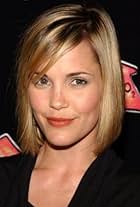
“Maggie Flanigan taught me the true meaning of artistry, passion, and professionalism. I am certain that I continue to work as an actress because of my training with Maggie. At every audition and every performance, her guiding voice is with me. It is a gift beyond measure.”

“Maggie Flanigan is uncompromising, her instincts as a teacher are razor sharp. She doesn’t miss a beat”

“Maggie Flanigan has been one of the most important people in my artistic life. I want to work with Maggie trained actors. As an actor myself, she is my first source. I do not say this lightly, if you are serious about acting, and willing to work very hard, then go to Maggie.”

“Maggie helped me find my sense of truth, an actors greatest asset. Maggie is an expert at instilling that vital ingredient, which allows an actor’s potential to become limitless. My work will forever be rooted in the clarity and honesty she helped me develop.”

“After working for ten years, I did the 2 year program, and now feel that I have the tools I need to become the actor I’ve always dreamed of being. Maggie Flanigan instilled in me a clear sense of truth and a standard of perfection. I am a better actor because of this studio.”

“As an actor, the core of what you have to rely on is your sense of truth and humanity. Maggie allowed me to discover and embrace mine. Trusting my sense of humanity and truth has given me the ability to take risks in my work and my career decisions.”

“Maggie Flanigan has the unique ability to get an actor to the essence of what is true in a moment. She creates a safe and caring environment in which to work.”

“Maggie Flanigan introduced me to my own spirit and my own sense of Truth. Her passion for teaching and ability to communicate are rare gifts to any actor looking for a technique to set his or her talent free. Maggie’s voice has been the one constant guide in my career.”

